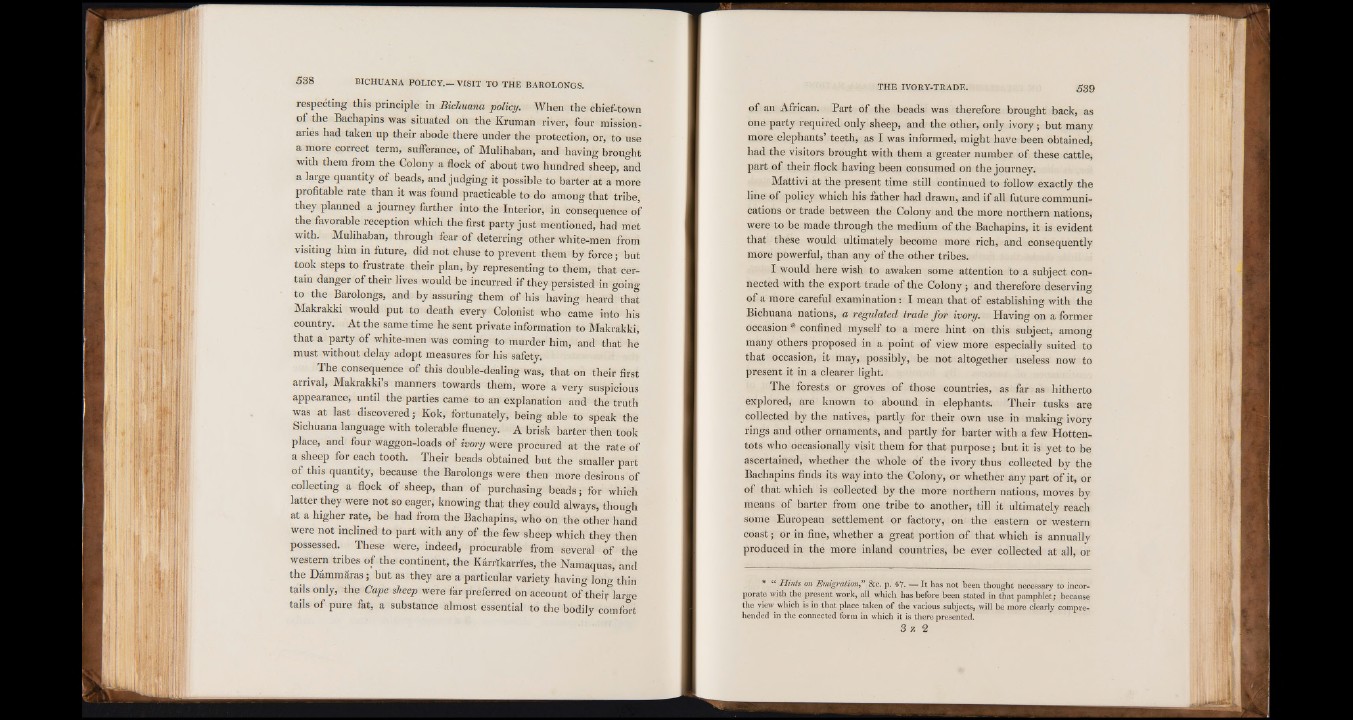
respecting this principle in Bichuana policy. When the chief-town
of the Bachapins was situated on the Kruman river, four missionaries
had taken up their abode there under the protection, or, to use
a more correct term, suiierance, of Mulihaban, and having brought
with them from the Colony a flock of about two hundred sheep, and
a large quantity of beads, and judging it possible to barter at a more
profitable rate than it was found practicable to do among that tribe,
they planned a journey farther into the Interior, in consequence of
the favorable reception which the first party just mentioned, had met
with. Mulihaban, through fear of deterring other white-men from
visiting him in future, did not chuse to prevent them by force; but
took steps to frustrate their plan, by representing to them, that certain
danger of their lives would be incurred if they persisted in going
to the Barolongs, and by assuring them of his having heard that
Makrakki would put to death every Colonist who came into his
country. At the same time he sent private information to Makrakki,
that a party of white-men was coming to murder him, and that he
must without delay adopt measures for his safety.
The consequence of this double-dealing was, that on their first
arrival, Makrakki’s manners towards them, wore a very suspicious
appearance, until the parties came to an explanation and the truth
was at last discovered; Kok, fortunately, being able to speak the
Sichuana language with tolerable fluency. A brisk barter then took
place, and four waggon-loads of ivory were procured at the rate of
a sheep for each tooth. Their beads obtained but the smaller part
of this quantity, because the Barolongs were then more desirous of
collecting a flock of sheep, than of purchasing beads; for which
latter they were not so eager, knowing that they could always, though
at a higher rate, be had from the Bachapins, who on the other hand
were not inclined to part with any of the few sheep which they then
possessed. These were, indeed, procurable from several of the
western tribes of the continent, the Karrlkarries, the Namaquas, and
the Dammaras ; but as they are a particular variety having long thin
tails only, the Cape sheep were far preferred on account of theif'large
tails of pure fat, a substance almost essential to the bodily comfort
of an African. Part of the beads was therefore brought back, as
one party required only sheep, and the other, only ivory 9 but many
more elephants’ teeth, as I was informed, might have been obtained,
had the visitors brought with them a greater number of these cattle,
part of their flock having been consumed on the journey.
Mattivi at the present time still continued to follow exactly the
line of policy which his father had drawn, and if all future communications
or trade between the Colony and the more northern nations,
were to be made through the medium of the Bachapins, it is evident
that these would ultimately become more rich, and consequently
more powerful, than any of the other tribes.
I would here wish to awaken some attention to a subject connected
with the export trade of the Colony; and therefore deserving
of a more careful examination : I mean that of establishing with the
Bichuana nations, a regulated trade for ivory. Having on a former
occasion * confined myself to a mere hint on this subject, among
many others proposed in a point of view more especially suited to
that occasion, it may, possibly, be not altogether useless now to
present it in a clearer light.
The forests or groves of those countries, as far as hitherto
explored, are known to abound in elephants. Their tusks are
collected by the natives, partly for their own use in making ivory
rings and other ornaments, and partly for barter with a few Hottentots
who occasionally visit them for that purpose; but it is yet to be
ascertained, whether the whole of the ivory thus collected by the
Bachapins finds its way into the Colony, or whether any part of it, or
of that which is collected by the more northern nations, moves by-
means of barter from one tribe to another, till it ultimately reach
some European settlement or factory, on the eastern or western
coast; or in fine, whether a great portion of that which is annually
produced in the more inland countries, be ever collected at all, or
# “ H ints on Em igration” &c. p. 4*7. — It has not been thought necessary to incorporate
with the present work, all which has before been stated in that pamphlet; because
the view which is in that place taken of the various subjects, will be more clearly comprehended
in the connected form in which it is there presented.
3 z 2